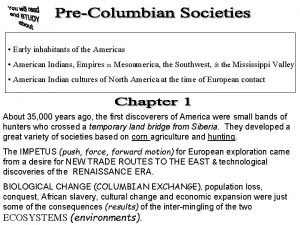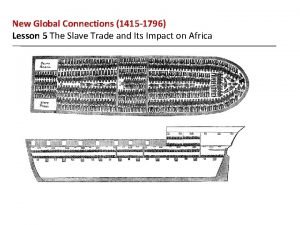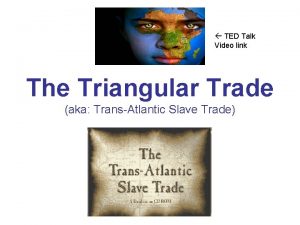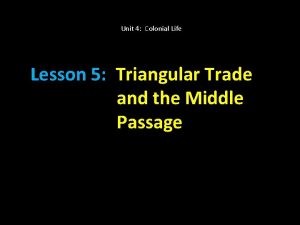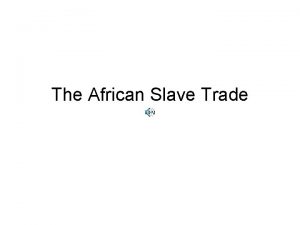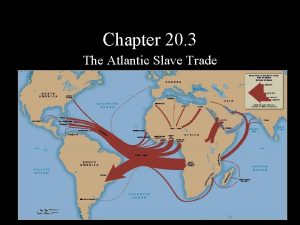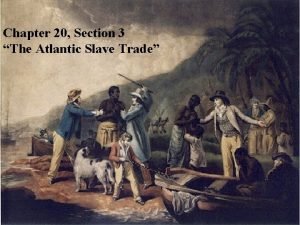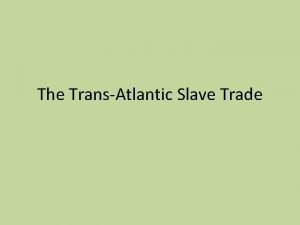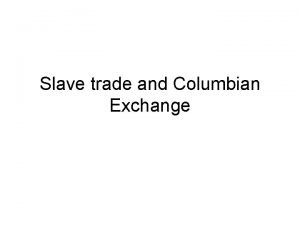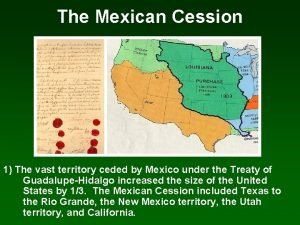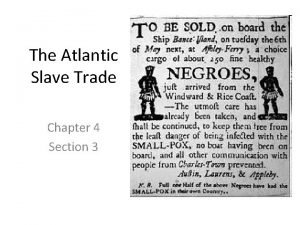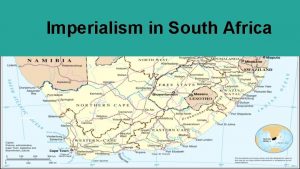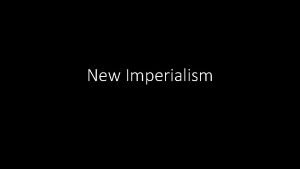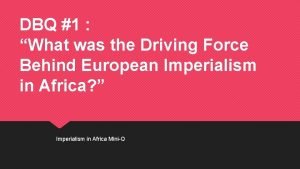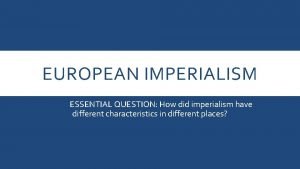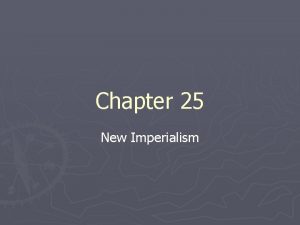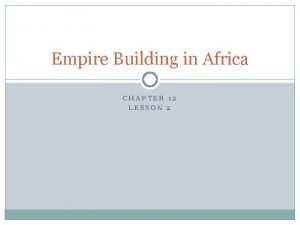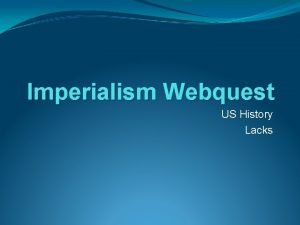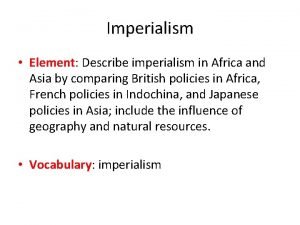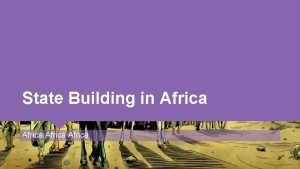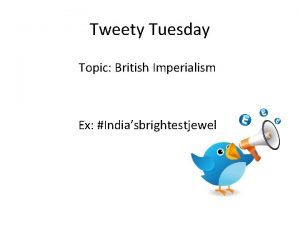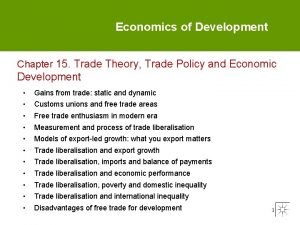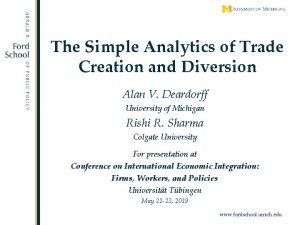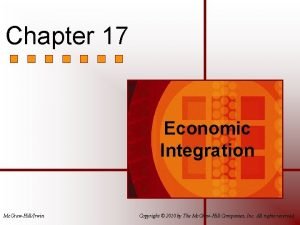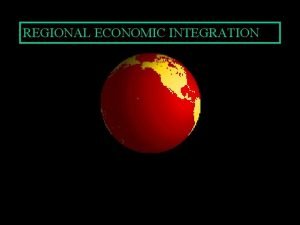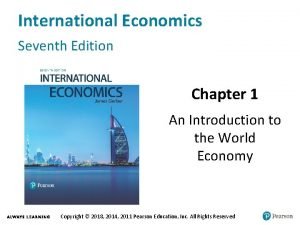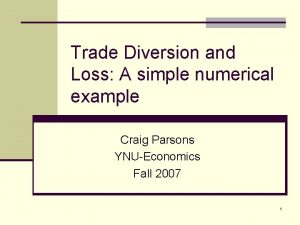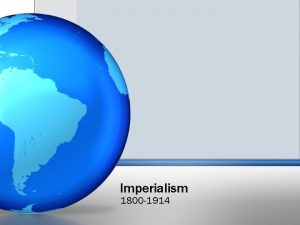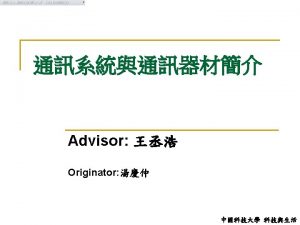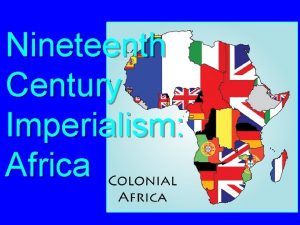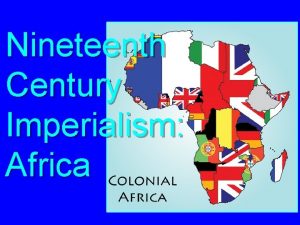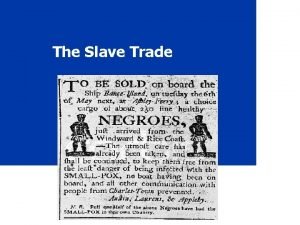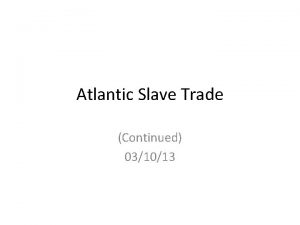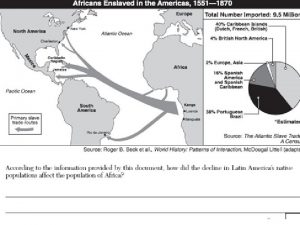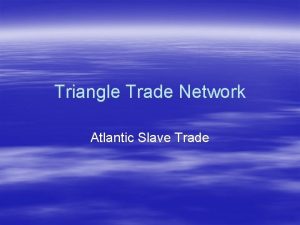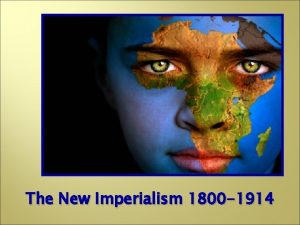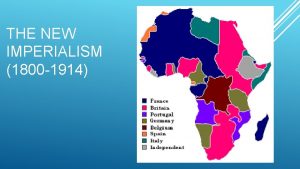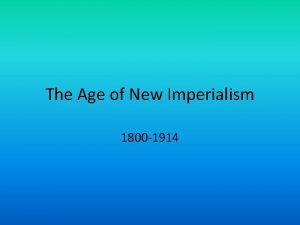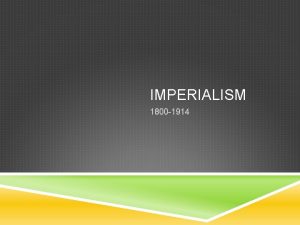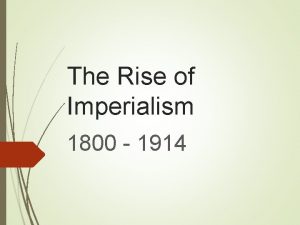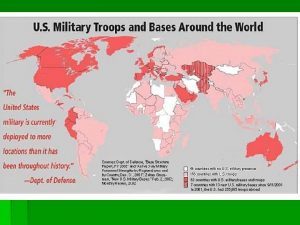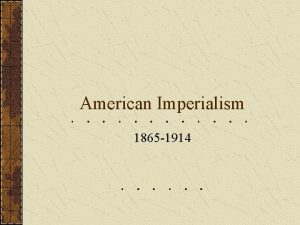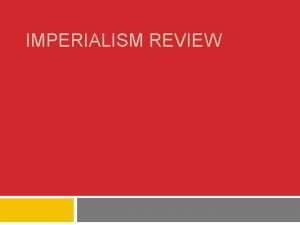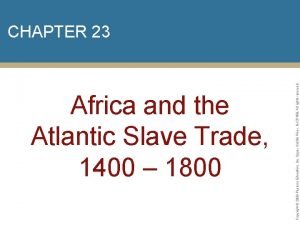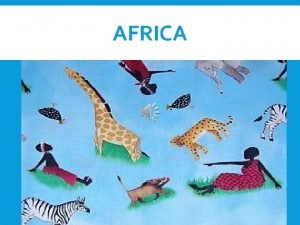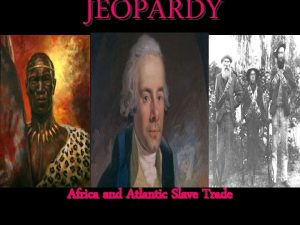Imperialism in Africa 1800 1914 SLAVE TRADE ENDS







































- Slides: 39

Imperialism in Africa 1800 -1914

SLAVE TRADE ENDS MID 1800 S……. . IMPERIALISM BEGINS

Most slave traders never ventured off the coast, used other Africans to travel through interior Before 1800 s, only the coast of Africa was known by Europeans, Why? ? Europeans lacked the technology & medicine to explore Africa. Developing a vaccine for malaria, steamboats & machine gun changed everything…

Scottish explorer • One of the first European explorers to venture to Africa • Mapped the Zambezi River, named Victoria Falls • Lost contact with outside world for 6 years!! • Wrote stories of his adventures and got other Europeans interested Found by reporter Mr. Stanley: Dr. Livingstone, I presume? ?

From the 1850 s-1880 s, Europeans rushed to Africa to each grab a piece of the pie


üBerlin, Germany 1885 ü 14 European nations met to divide Africa into colonies üNo Africans invited to conference……. . Why is this a problem? ? ?

Europeans divide tribes into different nations Place rival tribes together This leads to…………. . TRIBAL WARFARE

WHO GOT THE MOST COLONIES? WHICH TWO NATIONS REMAINED INDEPENDE NT? Liberia Ethiopia

Percentage of Colonization

Fashoda Crisis (1898): Diplomatic dispute between France and Great Britain. France wanted a continuous strip of territory West. East in Africa Britain wanted a continuous strip of territory North. South in Africa

POSITIVE 1. INFRASTRUCTURE/ INDUSTRIALIZATION: Public works are built in the colonies by the mother country. They are motivated by both profit and the desire to care for their colonial citizens. Roads Railroads Communication Systems Hospitals Schools Ports Factories

• Schools are built • Africans Are educated • The Literacy rate increases: – (percentage who can read & write) education was superior Students were Usually taught In the glorified the Mother country’s history while HISTORY But……Taught western European language & Ignoring LOCAL hero's &

3. • MODERN MEDICINE, HOSPITALS BROUGHT TO AFRICA

• Christian missionaries set up missions (churches) throughout Africa. Many Africans converted to Christianity. The bible will be used to teach the European language

• AFRICA AND EUROPEAN NATIONS TRADED GOODS, IDEAS, BELIEFS BETWEEN THEM

1. NATIONAL BOUNDARIES ARBITRARi. LY (RANDOM) LEADS TO TRIBAL CONFLICT AND WARFARE It also made unification or nationalism difficult to achieve

Mercantilism: When a mother country takes cheap raw materials from its colony & sells back expensive finished goods; creating a favorable balance of trade for the mother country. The colony is exploited: (to be taken advantage of) Colonies exist for the benefit of the m. c. • Loss of self-sufficiency: (provide for all your own needs) COLONIES BECAME DEPENDENT ON MOTHER COUNTRY’S GOODS AND SERVICES; THEY CANNOT SUPPORT THEMSELVES ANY LONGER • WHEN COLONIES LATER GAIN INDEPENDENCE, THEY HAVE NO EXPERIENCE GOVERNING THEMSELVES

AFRICAN CULTURE REPLACED WITH EUROPEAN CULTURE AND TRADITION through the process of assimilation: the process of adapting or adjusting to the culture of a group or nation EUROPEANS FORCED THEIR TRADITIONS, BELIEFS, CULTURE ON AFRICANS

Political Cartoon: Cecil Rhodes 1. How would you describe Cecil Rhodes in this political cartoon? 2. Based on this picture how do you think Cecil Rhodes viewed the continent of Africa? 3. Rhodes was once quoted as saying “I would annex the planets if I could. ” What do you think he meant by that?

DO NOW: Speaker A: “I contend that we are the first race in the world and that the more of the world we inhabit the better it is for the human race. I contend that every acre added to our territory provides for the birth of more of the English race … I believe it to be my duty to God, my Queen and my country to paint the whole map of Africa red, red from the Cape to Cairo” Speaker B: “A Pink Cheek man came one day to our Council … and he told us of the King of the Pink Cheek who lived in a land overseas. ‘This Great King is now your King. ’ This was strange news. For this land was ours … We had no King. But at the end he said, ‘This we know, but in spite of this what I have told you is a fact. You have now a king … and his laws are your laws. ”

diamond company De Beers, which today markets 40% of the world's rough diamonds and at one time marketed 90%

An ardent (fierce) believer in British colonial imperialism, he was the founder of the state of Rhodesia, which was named after him (present-day Zimbabwe)

King Leopold II Belgium • Publically: Mission was to “CIVILIZE” the African people • Privately: Conquering Africans & and making a profit • What did he need from Africa? Natural Resources • First European to establish trade agreements in Africa • Unable to read or write, tribal chiefs unknowingly sold their people into a lifetime of slavery for pieces of cloth. Leopold spoke of a civilizing mission to carry the “light that for millions of men still plunged in barbarism will be the dawn of a better era. ” How is the idea of White Man’s Burden expressed in this quotation?

THE CONTRACT READ: • In return for "one piece of cloth per month to each of the undersigned chiefs, besides present of cloth in hand, they promised to freely of their own accord, for themselves and theirs and successors for ever. . . give up to the said Association [set up by Leopold] the sovereignty and all sovereign and governing rights to all their territories. . . and to assist by labour or otherwise, any works, improvements or expeditions which the said Association shall cause at any time to be carried out in any part of these territories. . . All roads and waterways running through this country, the right of collecting tolls on the same, and all game, fishing, mining and forest rights, are to be the absolute property of the said Association. ” Source: http: //www. digitaljournal. com/blog/112 97

Belgian Congo • In the 23 years (1885 • Leopold laid personal claim to 1908) Leopold II ruled 905, 000 square miles (76 times the Congo he was larger than Belgium!) of African responsible for cutting rainforest that held a vast fortune off their hands and in rubber plantations genitals, flogging them • King Leopold II of Belgium was to death, starving them responsible for the deaths and mutilation of 10 million into forced labour, Congolese Africans during the holding children late 1800’s. ransom and burning • His personal fortune was villages. between $100 - $500 million dollars (This is later given to the Belgian Gov’t)

• • • Flogging with the chicotte (the chicotte was a whip made out of raw, sun-dried hippopotamus hide, cut into a long sharp-edged cork-screw strip). It was applied to bare buttocks, and left permanent scars. Twenty strokes of it sent victims into unconsciousness and a 100 or more strokes were often fatal. The chicotte was freely used by both Leopold's men and the French.

Video clips • A Brief History Of European Colonization in Africa • https: //www. youtube. com/watch? v=Pis 5 f 085 P 3 M &t=116 s • Congo the Brutal History • https: //www. youtube. com/watch? v=qx 2 Sj 1 fh. Sso • Crash course 3: 28 to 8: 20 https: //www. youtube. com/watch? v=al. Jalt. Umr. Go &t=609 s • 44 min clip https: //www. youtube. com/watch? v=Lb. T 44 Hwz. Nr. I

HOW DID AFRICANS RESIST EUROPEAN IMPERIALISM ?

What Was the Zulu Empire? Early 1800: Zulus emerged as a major force in Southern Africa Conquered rival groups & absorbed them into the Zulu Empire Battled European Slave traders & Ivory hunters Shaka was the ruthless & brilliant leader of the Zulu Empire

Shaka Zulu (1785 – 1828)

Who Challenged the Zulu Empire? Mid 1600 s: Dutch farmers settled in Southern Africa and built Cape Town as a supply station first slave trades established The Boers: Descendants of Dutch Farmers (spoke Afrikaan, called Afrikaners)

British Arrival British see Cape Town as a strategic location British seized territory, pushed Boers to north Great Trek- 10, 000 Afrikaners migrate to north Boers move to the Orange Free State and Transvaal regions. (Zulu tribe lands)

When the Boers & Zulus met, fighting broke out

Zulu-Anglo War (British) 1879 British colony felt threatened by the Zulu kingdom. British provoked an attack – 1, 300 British troops killed in first day (Jan 22). British defeated Zulu army and divided the kingdom btwn 13 pro-British Zulu chiefs (July 4). Led to civil war among the Zulu.

Summary 1. Main reason that European Powers wanted to gain land in Africa 2. Meeting in Germany where European leaders divided up Africa 3. Name of individual that wanted to connect Africa from “Cairo to Cape Town” 4. Name of African leader that resisted the Europeans 5. Conflict between the Dutch farmers and the British 6. System of racial segregation established by British in South Africa

Summary: Exit Ticket Tasks: 1. Choose one example of African Resistance: (African Zulus or African Boers) 2. Summarize the African Resistance in one of the following ways: Detailed Timeline (at least 5 events with description and visual) Rhyming Poem (6 -10 lines) Detailed Drawing (title, caption, 3 -5 sentence explanation required)

Give a specific historical example of each effect.

heck
 What god
What god Lesson 5 the slave trade and its impact on africa
Lesson 5 the slave trade and its impact on africa What was the triangular trade
What was the triangular trade Imperialism map 1914
Imperialism map 1914 Motives of old imperialism
Motives of old imperialism Old vs new imperialism
Old vs new imperialism Slave trade primary sources
Slave trade primary sources Atlantic slave trade
Atlantic slave trade The atlantic slave trade chapter 20 section 3
The atlantic slave trade chapter 20 section 3 The age of exploration outcome the atlantic slave trade
The age of exploration outcome the atlantic slave trade Chapter 20 section 3 the atlantic slave trade answer key
Chapter 20 section 3 the atlantic slave trade answer key Transatlantic slave trade apush
Transatlantic slave trade apush The age of exploration outcome the atlantic slave trade
The age of exploration outcome the atlantic slave trade Transatlantic slave trade pictures
Transatlantic slave trade pictures The transatlantic slave trade
The transatlantic slave trade Washington dc slave trade
Washington dc slave trade The transatlantic question
The transatlantic question Chapter 4 section 3 the atlantic slave trade
Chapter 4 section 3 the atlantic slave trade Destination america
Destination america Imperialism in africa timeline
Imperialism in africa timeline Imperialism
Imperialism The driving force behind european imperialism in africa
The driving force behind european imperialism in africa Legacy of imperialism
Legacy of imperialism New imperialism africa
New imperialism africa New imperialism africa
New imperialism africa Empire building in africa summary
Empire building in africa summary Imperialism in africa berlin conference
Imperialism in africa berlin conference Imperialism in india webquest
Imperialism in india webquest Describe imperialism in africa
Describe imperialism in africa Salt and gold trade in west africa
Salt and gold trade in west africa How did the silent barter system work
How did the silent barter system work Salt and gold trade in west africa
Salt and gold trade in west africa Fair trade not free trade
Fair trade not free trade Umich
Umich Trade diversion and trade creation
Trade diversion and trade creation Which is the most enduring free trade area in the world?
Which is the most enduring free trade area in the world? Tramp liner
Tramp liner The trade in the trade-to-gdp ratio
The trade in the trade-to-gdp ratio Trade diversion and trade creation
Trade diversion and trade creation Efg 1914
Efg 1914
